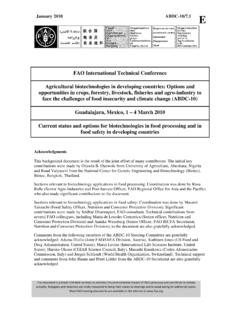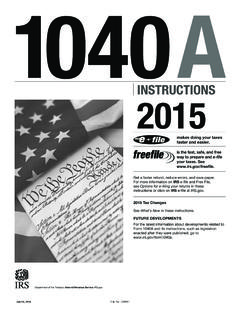Transcription of Counselors as Leaders in Schools
1 Becoming A Leader 114. Counselors as Leaders in Schools Florida Journal of Educational Robert J. Wingfield Administration & Policy University of Florida Ryan F. Reese Fall 2010. University of North Carolina at Greensboro Volume 4, issue 1. Cirecie A. West-Olatunji University of Florida There has been longstanding concern about school counselor because their roles have changed rapidly and significantly in response to societal trends. This has resulted in varying conceptions and misunderstandings of their roles. The present paper describes the emergence of school counseling as a profession, outlines the developmental history of school counseling models ( vocational guidance, mental health movement, and developmental guidance), argues that school Counselors should be promoted into leadership roles, and provides recommendations to school Counselors seeking leadership status. Furthermore, the authors explain that tactical advocacy for marginalized students and purposeful partnerships with principals are integral to bolstering school Counselors '.
2 Efficacy. Recommendations for the ways in which school Counselors can hone important leadership skills, particularly through professional development ( in-services, distance learning, continuing education courses) are offered. How these efforts might promote student achievement, empower stakeholders, and improve school culture is discussed. Key words: school counseling, leadership, advocacy, partnership, professional development Winter 2010 Florida Journal of Educational Volume 4, issue 1 Administration & Policy Becoming A Leader 115. School counseling emerged, and continues to evolve, in response to social, educational, political and economic trends (Paisley & Borders, 1995). Although each shift may be viewed as an inevitable reaction to societal demands, nonetheless, each shift has brought about increased ambiguity regarding their purpose within Schools . Even during periods in which societal factors have remained relatively constant, the work of school Counselors is often characterized by variety and fragmentation (Coll & Freeman, 1997; Lambie & Williamson, 2004; Martin, 2002).
3 Consequently, school Counselors have often been marginalized in Schools . Further, despite training in child development and multiculturalim, school Counselors are often overlooked as Leaders or cultural brokers in school communities (Amatea & West-Olatunji, 2007). The literature on leadership, regardless of tradition, has focused primarily on those in formal leadership positions, such as in the case of Schools , the principal (Spillane, Halverson, &. Diamond, 2004). Research on Schools has suggested that leadership is not the sole purview of the school principal; other professionals play vital roles in leading instructional innovation (Spillane et al.; Smylie & Denny, 1990; Heller & Firestone, 1995). This article offers valuable information to K-12 Counselors , counseling supervisors, counselor educators, principals, teachers, and other school staff regarding the leadership capacity inherent in school Counselors by virtue of their training, theoretical orientation, and mission.
4 The authors describe the evolution of school counseling by outlining its developmental history ( vocational guidance, mental health movement, and developmental guidance). A description of each era points to the current direction of school Counselors as Leaders , and suggests recommendations to school Counselors seeking leadership status. Winter 2010 Florida Journal of Educational Volume 4, issue 1 Administration & Policy Becoming A Leader 116. Table 1. Models of School Counseling, Era, Roles, and Training Major Vocational Mental Health Developmental Comprehensive Models of Guidance Movement in Guidance Competency Based School School School Counseling Counseling Counseling Guidance Programs Period 1900-1940's 1950's-1960's 1960's-1980's 1990's-2000's Match a Provide Primary prevention Integral to students'. Role student's remedial focus. daily educational personal services. environment. characteristics Integrate guidance with an Goals include: and counseling Goals Include: occupation help close program within the partner and leader achievement larger educational in student Goals include: gaps, especially program achievement with assist students culturally school in finding a diverse, low- Goals include.
5 Stakeholders, career income, increase student providing English achievement, vocational, language provide more remedial, and learners, and equitable services to developmental differing ability students, broader interventions based children impact on student on student data development and career decision- making, student satisfaction, & safe, orderly, connected school climate Training in Training in Training focuses on Multicultural Training assessment of prevention & identifying the training that occupational intervention developmental needs encourages school selection and skills to close of students to meet Counselors to placement for achievement the diverse needs of advocate for the all students gaps students academic achievement of all students Timeline of the School Counseling Movement. The ASCA (2005) National Model incorporates these various roles into its framework and culminates these roles into one of leadership.
6 Winter 2010 Florida Journal of Educational Volume 4, issue 1 Administration & Policy Becoming A Leader 117. School Counseling Models In this section, a brief overview of the major roles school Counselors have exhibited in the past 100 years, and how these roles have addressed underachieving students during each era is provided. Each era has contributed its own characteristics to a position of community leadership that the American School Counselor Association (ASCA) (2005) National Model promotes in the 21st century (See Table 1). The vocational era shaped the notion that school Counselors assisted students in finding career avenues relevant to their interests and passions. The mental health movement expanded the career focus of the school counselor to responding to the personal/social aspects of students and their families in the form of remedial services. This movement encouraged school Counselors to consider the unique developmental circumstances their diverse students face in reaching quality education.
7 Finally, the Comprehensive Competency Based School Counseling Guidance Programs (CCBSCGP) movement focuses more on how school Counselors can serve as Leaders to meet the academic, vocational, and personal/social needs of students while collaborating with school stakeholders. These eras are discussed below. Vocational Guidance Researchers have suggested that the school counseling profession began in the era of vocational guidance, in response to social reform when there was a public outcry against child labor and the industrial boom in the late 1800's (Krumboltz & Kolpin, 2003). Before vocational guidance found its way into Schools , the field was dedicated to helping people find occupations that would allow them to become contributing members of society. Frank Parsons, considered the father of vocational guidance, is credited with advocating for trained professionals to perform vocational guidance in public Schools during the first decade of the 20th century (Gysbers &.)
8 Henderson, 2000, p. 4). Later, World Wars I and II compounded the need for widespread vocational assessment (Myrick, 2003). When the military needed to effectively and quickly determine the skills and competencies of soldiers to create a cohesive and dominant force, school Counselors addressed this need using assessment. Assessment took the guesswork out of determining the roles millions of soldiers would play in the wars. Moreover it allowed the military to focus its efforts on how these roles would be carried out. Academic achievement issues in the vocational guidance movement also emphasized character development and problem behavior prevention, elements promoted in most of today's school counseling programs (Schmidt, 1999). Professionally trained guidance personnel were able to reach large numbers of students with vocational guidance but the mental health needs of students were not directly confronted until the middle of the 20th century (Krumboltz & Kolpin).
9 Mental Health Movement While the vocational movement focused on the career needs of students, it did not take into account how academic achievement and job choice might be affected by the personal/social needs of students. Carl Rogers' nondirective approach to counseling encouraged many school Winter 2010 Florida Journal of Educational Volume 4, issue 1 Administration & Policy Becoming A Leader 118. Counselors to concentrate more on the mental health needs of students (a remedial approach). rather than the earlier direct assessment approaches (Schmidt, 1999). Little attention had been given to diversity issues in the literature prior to the 1950's. In the 1950's mental health workers responded to diverse students who faced rising tensions and difficult circumstances associated with civil rights issues, changes in family structure ( , divorce), and increases in crime (Myrick, 2003). With these societal changes and given the increased attention and training on remedial counseling, school Counselors began focusing on ways to reach students with individualized problems and concerns (Wrenn, 1962).
10 As such, school Counselors were encouraged to: (a) assume leadership roles in Schools , (b) provide consultative services for school stakeholders, and (c) offer small group and individual counseling with students. As educational stakeholders began to criticize the remedial approach school Counselors were encouraged to play a greater role in curriculum development and mental health service delivery (Dollarhide & Saginak, 2008; Myrick, 2003). Opponents to incorporating mental health in school counseling argued that too few students were reached by remedial services. The R.'s launching of Sputnik in 1957 and passing the National Defense Education Act of 1958 promoted nationwide academic achievement in mathematics and science. As a result, more school Counselors were trained and hired to encourage all students to pursue mathematics and science, once again placing a greater emphasis on assessment and vocational guidance (Baker, 2000).














